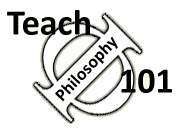Teach Philosophy 101
Free resources for
philosophy teachers!
"One of the most comprehensive, well-researched, and accessible guides for teachers that I have ever seen." James Lang, Chronicle of Higher Education (read full review of TΦ101)
Permission and Copyright
Unless otherwise indicated on the specific page, all information on TΦ101 is covered by the Attribution Share Alike License developed by Creative Commons. The individual author of each page is also indicated on that page. The Attribution Share Alike License allows you to copy, share, remix, tweak, and build upon this work (even for commercial reasons), as long as you credit the author and license your new creations under the identical terms. See the license itself for precise details. You may also contact the author directly if you wish the author to waive the license and work out other arrangements.
Printing from TΦ101. You may print and distribute as many copies of this material you want, as long as you follow the terms of the license. To print, click on the printer friendly icon next to the date above. First print a test page, and if some of the lines are truncated you may need to pull down the "file" menu and widen the margins before printing.
Warning: Distribution of Materials to your Classes. Much of what you will find here is intended to suggest approaches and methods for teaching philosophy. However, you may also find language here that you wish to adapt verbatim for your own course materials. For your own protection you should give attribution for any material that you adapt or closely paraphrase. While it may seem unusual to indicate sources in materials such as a syllabus or a paper assignment, please contemplate the following scenario:
-
Imagine that you find something on this website, or somewhere else on the web, that seems really useful, and you adopt it without attribution in your own course materials.
-
Now imagine that a student in your class pulls paragraphs from SparkNotes into an assigned philosophy paper. You immediately detect the source, accuse the student of plagiarism and fail the student on the paper.
-
Now imagine that the student (or the student’s “helicopter” dad) goes on a personal vendetta against you, and discovers that some of your material is “plagiarized” from the web. This could create a highly embarrassing situation for you. As the students say, "You don't want to go there."
What is the harm in providing some documentation, even in a syllabus or class exercise? We should model for our students that we are scrupulous about academic integrity and we expect the same from them.
For materials that are used only within your own classes, you may use a less formal documentation system than would be appropriate for a scholarly article. Rather than acknowledging the individual author and the specific material that you have drawn upon, you may – if you wish – source the material as follows: “Some material has been adapted, with permission, from TeachPhilosophy101, [list the URL of the specific page from which you drew the material]."
Author: John Immerwahr
Update: May 4, 2011
